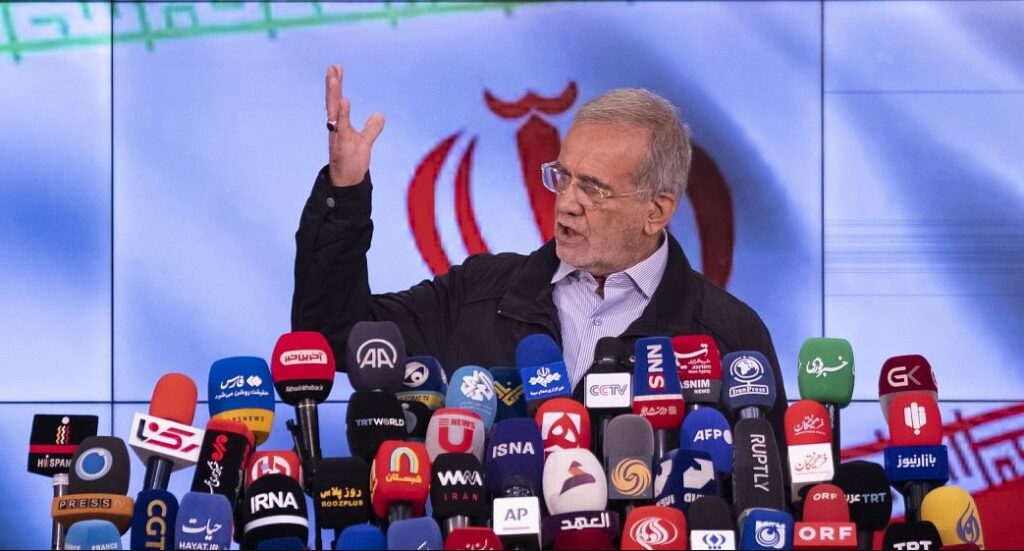A careful reading of the Iranian new president’s political positions demonstrates that he is seeking for an “accommodation” in foreign policy through constructing a political consensus in the domestic politics, bridging the reformist and conservative forces, Kayhan Barzegar writes.
On July 5, 2024, Masoud Pezeshkian was elected as the 14th President of the Islamic Republic of Iran. During the presidential campaign, he emphasized that he would try to remove the economic sanctions through interaction with the West, recovering Iranians economic livelihood and welfare. He also published an article in Tehran Times daily on July 13 entitled, “My Message to the New World” defining his core foreign policy objective as to create “balance” in relations with all countries. In the same article, he emphasized that his administration will prioritize strengthening relations with Iran’s neighbors, increased relations with Russia and China, and interacting with the West from an equal political angle. On July 28 and in his endorsement ceremony in front of the Supreme Leader Ayatollah Ali Khamenei, he emphasized that he will continue Iran’s political system and the Supreme Leader’s vision in the conduct of major foreign policy subjects. On July 30 and in his inauguration ceremony in the Majlis (the Iranian parliament), he stated that he would form a “national consensus” administration, based on an “accommodative” approach.
A careful reading of the political positions of Iran’s newly elected moderate president demonstrates that he is seeking for an “accommodation” in foreign policy through constructing a political consensus in the domestic politics, bridging the reformist and conservative forces. In this respect, one can note that the foreign policy of Pezeshkian would be rather different from that of the previous administrations. The Rouhani administration pursued a foreign policy based on reducing tensions with the West to lift the economic sanctions. The late Raisi administration prioritized strengthening relations with the neighbors and Eastern bloc, as well as managing economic life without the JCPOA (the nuclear deal) and improved relations with the West. President Pezeshkian strives to pursue a foreign policy that can balance relations with both the East and the West in the light of preserving Iran’s national interests. From this perspective, the Pezeshkian’s foreign policy would be a synthesis of the two previous administrations.
Iran’s foreign policy has two determinants of “substance” and “process.” The substance refers to deterring threats and producing security, and the process refers to economic growth and sustainable development and thus the necessity of interaction with all countries. The key to Pezeshkian’s administration to proceed a successful foreign policy is to combine and balance these two determinants. In terms of the substance, Iran’s current strategic foreign policy issues, such as the JCPOA, managing the relations with the United States, looking to the East (Russia and China), and relations with the regional states and the axis of resistance, are decided by the Supreme Leader and the Supreme National Security Council. But in terms of the process and execution, the conduct of these subjects is in the mandate of the president. In fact, the executive branch, especially the Ministry of Foreign Affairs, has the financial resources, tools, and specialized political and economic capacities necessary to implement these foreign policy subjects.
First, revival of the JCPOA in the substance is regarded in the context of Iran’s needed energy security, development of fundamental industries, etc., and also confronting the Western obstruction on the advancement of the country’s peaceful nuclear program. Yet, in the process, it is perceived in the context of lifting sanctions and economic growth to ensure Iranians welfare. Consequently, deducting the issue of JCPOA to one of these determinants has previously resulted in conflicting views among the Iranian political forces.
Second, managing the relations with the US in the substance is related to the issue of deterring the US threats, which has been manifested in the regime change policy or undermining Iran’s deserved regional role in its own geopolitical environment. Yet, in the process, due to the US role in spoiling Iran’s potentials to acquire capital and technology at the world stage, and also using the tool of sanctions to put pressure on Iran, the president is obliged to manage relations and tensions with the US and other Western countries (even though minimal) in order to withdraw from the current economic impasses.
Third, looking to the East policy in the substance is regarded in the context of the necessity of strengthening relations with the non-Western world and the Global South in order to enhance Iran’s geostrategic status in the era of global geopolitical disorder. However, in the process, the government is mandated to leverage for obtaining foreign capitals and technology in both regional and international arena. State’s enhanced interactions with the world are also needed, as the government requires exporting energy and commodities to mitigate the harmful impacts of Western economic sanctions.
Fourth and finally, regarding the relations with neighboring countries and the axis of resistance groups, in the substance the subject relates to strengthening Iran’s deterrent power in confronting the US and Israel’s threats, as well as combatting terrorism (such as ISIS) by enhancing the status of friendly partner forces. Yet, in the process, this issue potentially delays Iran’s extensive economic and political interactions with the wealthy Arab neighbors, as a strengthening axis of resistance rises the political-security vulnerability of the Arab regimes, and therefore they expect Iran to halt supporting these forces.
In order to find an accommodation in the advancement of foreign policy, the Pezeshkian administration would require to find a practical common track to combine and balance the substance and the process of conducting Iran’s foreign policy. In reality, no administration in Iran could ignore the linkage between the two focal tasks of foreign policy that are deterring the threat (substance) and executing the sustainable economic development (process) at the expense of one another.
In this respect, and regarding the revival of the JCPOA or any other nuclear deal, Iran’s new administration will strive to continue the nuclear negotiations with the West from an equal political footing. It will further cooperate with the IAEA through diplomatic channels to reach an acceptable deal with the involved parties. The reality is that the intensification of Iran’s nuclear activities, occurred after the US unilateral withdrawal from the JCPOA in May 2018, can be reversed under the conditions of good faith and positive practical action of the Western side. For instance, Iran can even return to the voluntary implementation of the Additional Protocol and limit the level of uranium enrichment according to its needs.
As to the relations with the United States, the new administration will continue utilizing diplomatic channels to remove the economic sanctions and manage the existing tensions. It will also exploit Iran’s geopolitical superiority as a leverage to bargain in acquiring capitals and technology. Increased relations with Russia and China will be continued due to geographical determinism, mutual strategic needs, and necessity of engaging the regional supply chain of commodities in the diverse peripheral sub-systems.
Finally, regarding its regional policy, strengthening the relations with Saudi Arabia, will be central for the Pezeshkian administration, as it will lead to a chain expansion of Iran’s relations with other Arab countries in the broader Middle East. Recently, King Abdullah of Saudi Arabia sent a letter of goodwill to Pezeskian, emphasizing the necessity of expanding bilateral relations. In this respect, Iran’s new administration will adopt a more active policy to establish a permanent ceasefire in Gaza through further collaboration with Saudi Arabia and other involved regional countries. The Gaza war and Iran’s direct confrontation with Israel have strengthened the diplomatic leverages of the Saudis in the prospective ceasefire negotiations, subsequently the country’s pressure on Israel to accept the two-state solution. This development can balance Iran’s security dilemma in managing simultaneously the relations with both the regional states and the axis of resistance. Even the recent assassination of Hamas political leader Ismail Haniyeh in Tehran by the Israeli regime and Iran’s prospective political or military responses is likely to further balance the triangle of relations between Iran-Arab countries-the axis of resistance.


